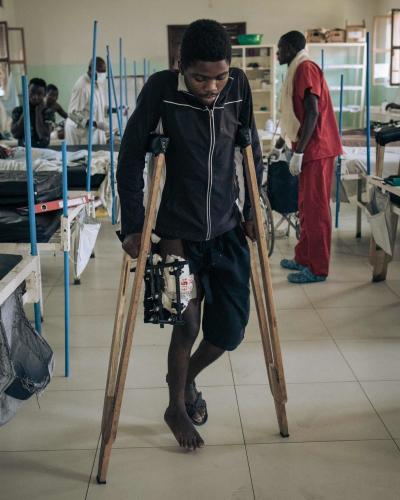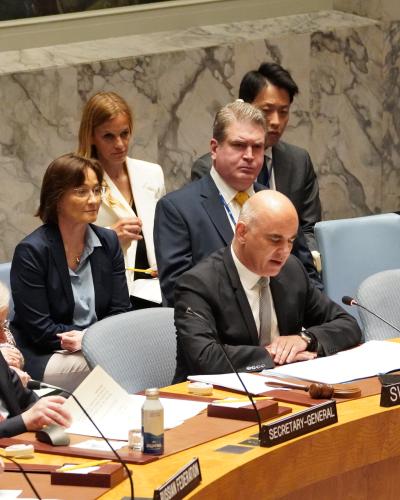As a civilian, how much information would you share? To whom would you entrust your digital identity?
These questions were raised by Swiss President Alain Berset at the opening of a multimedia experience organized by the Swiss Confederation and the International Committee of the Red Cross (ICRC) on 22 May 2023, during Switzerland’s presidency of the Security Council. Around 75 guests attended the event, including H.E. President Nyusi of Mozambique and Permanent Representatives from various missions and UN entities. ICRC President Mirjana Spoljaric and guest of honour UN Deputy Secretary-General Amina Mohammed gave introductory remarks.
Living through a crisis in the digital age confronts civilians and humanitarian workers with digital dilemmas - which have real life consequences! Artificial intelligence, biometrics and other digital technologies can alleviate the burden on civilians in conflict. But they are also a source of new risks, such as disinformation and illicit surveillance. Similarly, sharing personal data can help civilians find their loved ones, access healthcare, food or water, but it can also create vulnerability by exposing information about their ethnicity, gender, location, health or beliefs.
Hence the urgency to tackle the potential misuse and abuse of emerging technologies, notably by fostering trust between humanitarian actors, civilians, authorities and parties to a conflict; respecting international humanitarian law; or ensuring an equal access to humanitarian aid and information between men and women, which were some of the different solutions and approaches raised by the speakers at the inauguration.
Why are these issues so close to Switzerland’s heart? The protection of civilians in armed conflict is one of Switzerland’s core foreign policy objectives, as well as one of its priorities for its Security Council membership 2023 – 2024. The country has a long track record in humanitarian aid and has consistently worked to improve compliance with - as well as strengthen - international humanitarian law. In this endeavor, Switzerland could hardly find a more fitting partner than the ICRC, headquartered in Geneva.
Initially presented in Geneva in 2019, the Swiss Confederation and the ICRC brought the Digital Dilemmas experience to the UN Headquarters in New York by refocusing it on the protection of civilians (PoC). Indeed this is one of the main themes in New York during the month of May, with the Security Council debating the UN Secretary-General’s annual report on the protection of civilians, as well as many side events with civil society actors.
Located at the Delegates Entrance of the UN Headquarters from the 22nd to the 31st of May 2023, an accessible cube with LED walls allows visitors to take on the roles of civilians or humanitarian actors during a conflict. Upon entering the cube, they can experience a series of video scenarios and make choices about the use of digital technologies. By confronting visitors with tough but realistic digital dilemmas, Switzerland and the ICRC aim to raise awareness of digital risks, encourage dialogue - notably with ICRC delegates present on site - and, ultimately, better protect civilians in the digital age. After New York in May, the ICRC will carry the torch forward by presenting Digital Dilemmas in other locations and providing an online experience.




